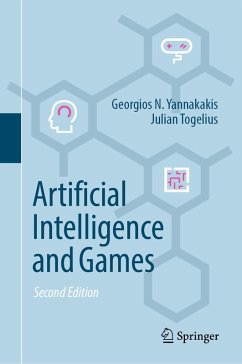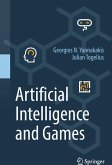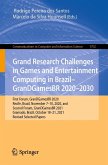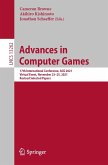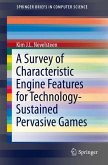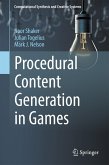48,95 €
48,95 €
inkl. MwSt.
Sofort per Download lieferbar

24 °P sammeln
48,95 €
Als Download kaufen

48,95 €
inkl. MwSt.
Sofort per Download lieferbar

24 °P sammeln
Jetzt verschenken
Alle Infos zum eBook verschenken
48,95 €
inkl. MwSt.
Sofort per Download lieferbar
Alle Infos zum eBook verschenken

24 °P sammeln
- Format: PDF
- Merkliste
- Auf die Merkliste
- Bewerten Bewerten
- Teilen
- Produkt teilen
- Produkterinnerung
- Produkterinnerung

Bitte loggen Sie sich zunächst in Ihr Kundenkonto ein oder registrieren Sie sich bei
bücher.de, um das eBook-Abo tolino select nutzen zu können.
Hier können Sie sich einloggen
Hier können Sie sich einloggen
Sie sind bereits eingeloggt. Klicken Sie auf 2. tolino select Abo, um fortzufahren.

Bitte loggen Sie sich zunächst in Ihr Kundenkonto ein oder registrieren Sie sich bei bücher.de, um das eBook-Abo tolino select nutzen zu können.
Book content class- and industry-tested by leading academic lecturers, researchers and game developers Hot topic in game development and academic game research Suitable for undergraduate and graduate courses in games, artificial intelligence, design, human-computer interaction, and computational intelligence
- Geräte: PC
- ohne Kopierschutz
- eBook Hilfe
- Größe: 33.69MB
Andere Kunden interessierten sich auch für
![Artificial Intelligence and Games (eBook, PDF) Artificial Intelligence and Games (eBook, PDF)]() Georgios N. YannakakisArtificial Intelligence and Games (eBook, PDF)28,95 €
Georgios N. YannakakisArtificial Intelligence and Games (eBook, PDF)28,95 €![Grand Research Challenges in Games and Entertainment Computing in Brazil - GranDGamesBR 2020-2030 (eBook, PDF) Grand Research Challenges in Games and Entertainment Computing in Brazil - GranDGamesBR 2020-2030 (eBook, PDF)]() Grand Research Challenges in Games and Entertainment Computing in Brazil - GranDGamesBR 2020-2030 (eBook, PDF)60,95 €
Grand Research Challenges in Games and Entertainment Computing in Brazil - GranDGamesBR 2020-2030 (eBook, PDF)60,95 €![Advances in Computer Games (eBook, PDF) Advances in Computer Games (eBook, PDF)]() Advances in Computer Games (eBook, PDF)56,95 €
Advances in Computer Games (eBook, PDF)56,95 €![Evolutionary and Biologically Inspired Music, Sound, Art and Design (eBook, PDF) Evolutionary and Biologically Inspired Music, Sound, Art and Design (eBook, PDF)]() Evolutionary and Biologically Inspired Music, Sound, Art and Design (eBook, PDF)38,95 €
Evolutionary and Biologically Inspired Music, Sound, Art and Design (eBook, PDF)38,95 €![A Survey of Characteristic Engine Features for Technology-Sustained Pervasive Games (eBook, PDF) A Survey of Characteristic Engine Features for Technology-Sustained Pervasive Games (eBook, PDF)]() Kim J. L. NevelsteenA Survey of Characteristic Engine Features for Technology-Sustained Pervasive Games (eBook, PDF)40,95 €
Kim J. L. NevelsteenA Survey of Characteristic Engine Features for Technology-Sustained Pervasive Games (eBook, PDF)40,95 €![Intelligent Technologies for Interactive Entertainment (eBook, PDF) Intelligent Technologies for Interactive Entertainment (eBook, PDF)]() Intelligent Technologies for Interactive Entertainment (eBook, PDF)40,95 €
Intelligent Technologies for Interactive Entertainment (eBook, PDF)40,95 €![Procedural Content Generation in Games (eBook, PDF) Procedural Content Generation in Games (eBook, PDF)]() Noor ShakerProcedural Content Generation in Games (eBook, PDF)38,95 €
Noor ShakerProcedural Content Generation in Games (eBook, PDF)38,95 €-
-
-
Book content class- and industry-tested by leading academic lecturers, researchers and game developers
Hot topic in game development and academic game research
Suitable for undergraduate and graduate courses in games, artificial intelligence, design, human-computer interaction, and computational intelligence
Dieser Download kann aus rechtlichen Gründen nur mit Rechnungsadresse in A, B, BG, CY, CZ, D, DK, EW, E, FIN, F, GR, HR, H, IRL, I, LT, L, LR, M, NL, PL, P, R, S, SLO, SK ausgeliefert werden.
Produktdetails
- Produktdetails
- Verlag: Springer International Publishing
- Seitenzahl: 525
- Erscheinungstermin: 2. Juni 2025
- Englisch
- ISBN-13: 9783031833472
- Artikelnr.: 74341737
- Verlag: Springer International Publishing
- Seitenzahl: 525
- Erscheinungstermin: 2. Juni 2025
- Englisch
- ISBN-13: 9783031833472
- Artikelnr.: 74341737
- Herstellerkennzeichnung Die Herstellerinformationen sind derzeit nicht verfügbar.
Georgios N. Yannakakis is an Associate Professor at the Institute of Digital Games, University of Malta (UoM). He received his Ph.D. in informatics from the University of Edinburgh in 2006. He was previously an Associate Professor at the Center for Computer Games Research at the IT University of Copenhagen. His research lies at the crossroads of artificial intelligence, computational creativity, affective computing, and human-computer interaction with an emphasis on the domain of games. He has published over 200 journal and conference papers in the aforementioned fields, his research has been supported by numerous national and European grants, and it has been featured in Science Magazine and New Scientist among other publications. He is an associate editor of the IEEE Trans. on Computational Intelligence and AI in Games and was an associate editor of the IEEE Trans. on Affective Computing (2009-2016). He was the general chair of related key conferences such as IEEE CIG(Computational Intelligence and Games) and Foundations of Digital Games (FDG).
Julian Togelius is an Associate Professor in the Dept. of Computer Science and Engineering of New York University, and a codirector of the NYU Game Innovation Lab. He was previously an Associate Professor at the Center for Computer Games Research, IT University of Copenhagen. He works on all aspects of computational intelligence and games and on selected topics in evolutionary computation and evolutionary reinforcement learning. His current main research directions involve search-based procedural content generation, game adaptation through player modelling, automatic game design, and fair and relevant benchmarking of game AI through competitions. He is the Editor-in-Chief of the IEEE Transactions on Games.
Julian Togelius is an Associate Professor in the Dept. of Computer Science and Engineering of New York University, and a codirector of the NYU Game Innovation Lab. He was previously an Associate Professor at the Center for Computer Games Research, IT University of Copenhagen. He works on all aspects of computational intelligence and games and on selected topics in evolutionary computation and evolutionary reinforcement learning. His current main research directions involve search-based procedural content generation, game adaptation through player modelling, automatic game design, and fair and relevant benchmarking of game AI through competitions. He is the Editor-in-Chief of the IEEE Transactions on Games.
Foreword to the Second Edition.- Foreword to the First Edition.- Preface.- Acknowledgments.- Contents.- Acronyms.- Website.- 1. Introduction.- Part I. Background.- 2. AI Fundamentals.- 3. AI Methods for Games.- Part II. Play.- 4. Playing Games.- 5. Methods for Playing Games.- 6. Gameplaying AI by Game Genre.- Part III. Generate.-7. Procedural Content Generation.- 8. Methods for Generating Content.- 9. Procedural Content Generation by Content Type.- Part IV. Model.- 10. Player Modeling.- 11. From Observations to Models of Players.- 12. Player Modeling Exemplified.- Part V. The Road Ahead.- 13. Panorama and Map of Synergies.- 14. Frontiers of AI and Games Research.- 15. Ethics of AI and Games.- References.- Index.
Foreword to the Second Edition.- Foreword to the First Edition.- Preface.- Acknowledgments.- Contents.- Acronyms.- Website.- 1. Introduction.- Part I. Background.- 2. AI Fundamentals.- 3. AI Methods for Games.- Part II. Play.- 4. Playing Games.- 5. Methods for Playing Games.- 6. Gameplaying AI by Game Genre.- Part III. Generate.-7. Procedural Content Generation.- 8. Methods for Generating Content.- 9. Procedural Content Generation by Content Type.- Part IV. Model.- 10. Player Modeling.- 11. From Observations to Models of Players.- 12. Player Modeling Exemplified.- Part V. The Road Ahead.- 13. Panorama and Map of Synergies.- 14. Frontiers of AI and Games Research.- 15. Ethics of AI and Games.- References.- Index.
